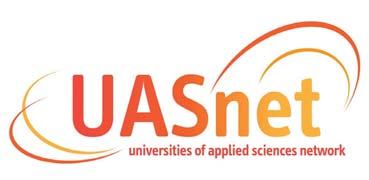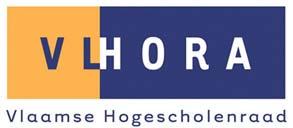
6 minute read
63
by 5rXobdlLrFp
UAS4EUROPE Croissant Event of 25 September 2018: UAS on Horizon Europe
Bruno Van Koeckhoven, Secretary-general of UASnet
Advertisement
© VHLORA
On 25 September 2018, UAS4EUROPE, the emerging network for Universities of Applied Sciences (UAS) in Europe, organised the second ‘Croissant Event’ in Brussels to highlight the point of view and position paper of the UAS in Europe regarding the proposal of the European Commission (EC) on the new research program ‘Horizon Europe’. More than 80 EU-liaison officers of UAS, staff members, policymakers and directors from more than 20 European countries participated that morning at the Permanent Representation of the Netherlands to the EU in Brussels. Special invitees were Fabienne Gautier, Director at the DG RTD of the European Commission, and Angelika Niebler, Member of the European Parliament (EP) and an important voice in the ITRE Committee of the EP. This event was moderated by Karin Lukas-Eder (BayFOR Brussels Office).
Introduction
Ronald van Roeden, Deputy Representative of The Netherlands to the EU, welcomed everybody by stressing the importance of applied research by the Universities of Applied Sciences (UAS) in Europe, often known as “hogescholen, hautes écoles, institutes of technology, fachhochschulen…”. These higher education institutes are known for their multidisciplinary research focused on impact and on improving the life of the European citizens. Applied researchers at the UAS are the perfect bridge builders between fundamental research and society. After all, UAS are strongly connected with the labour market, which includes companies and SME’s and social profit organisations (hospitals, local governments, etc.). On top of that UAS have a very strong knowledge in Social Sciences, Humanities and Arts (SSHA).
Henrik Wolff, the official Representative and Chairman of UAS4EUROPE for this academic year (2018-2019), explained that this emerging network represents about 470 UAS in 14 European countries. It is now the biggest collaboration and networking platform of UAS in Europe focussing on EU research policy. He stated: “the EU needs the researchers of the UAS to make the future program Horizon Europe a true success. Applied research in Europe is not used by its full potential yet.”
Keynote speaker
Fabienne Gautier, Head of Unit Open Science and ERA Policy at the Directorate-General for Research and Innovation of the European Commission, emphasized the important role of the UAS in the design of “Horizon Europe”. “The EC wants to involve more the non-academic sector in this future research program. So, the UAS are invited to shape Horizon Europe which focusses on co-creation and impact of research”, she clarified in general.
Panel Discussion
1. Angelika Niebler – ITRE Committee, European Parliament Angelika Niebler, not only a politician but also a professor in the UAS of München (Hochschule für angewandte Wissenschaften München), clarifies that the biggest innovation problem in the EU is the Innovation Paradox or Death Valley: “In Europe we have excellent research, but the EU has problems to transfer this knowledge to the labour market in concrete products and services. Therefore the applied and practice-based research of UAS should be promoted and supported. UAS play a key role in the transfer of innovation to the economy and the regions.”
She gives an overview of 5 hot topics which are discussed nowadays in the Committee ITRE (EP): 1) The increase of the budget of Horizon Europe up to € 120 billion (or more) 2) How can we involve all possible researchers in the EU, instead of always the usual suspects? 3) How can we attract more new innovation players in the Horizon Europe program? 4) How can we involve more citizens in this program? E.g. innovation projects to counter nationalism 5) Much attention is given to the Global Challenges in Pillar 2.
2. Johann Kastner – Vice-President of UAS Upper Austria Johan Kastner pointed out that UAS are the perfect “innovation-bridgers” between basic research and the labour market. UAS are specialised in practical market oriented innovation. 1) “In the nearby future the individual research fields should collaborate more closely to master the challenges of the future. The UAS have a lot of expertise in multidisciplinarily research. Therefore the EC and the EP should make it possible to support smaller and more flexible innovation consortia in order to work together efficiently. Smaller multidisciplinary
research consortia should therefore be more firmly anchored in the UAS4EUROPE-budget,” said professor Kastner of the Fachhochschule Oberösterreich. 2) He also stressed that the Marie Skłodowska-Curie Actions (MSCA) should be open to applied researchers, not to strictly academic staff alone. This would allow researchers of UAS to participate. The inclusion of UAS in MSCA consortia would support a smoother cooperation between industry and academia, given the applied nature of the research carried out in these institutions.
3. Elke Decrock - EU-Liaison Officer UAS Artevelde (Flanders) Elke Decrock focusses on 3 subjects of the Position Paper of UAS4EUROPE: 1) The proposal of the EC is too much focused on technology innovation. It should allow more focus on the quality of life of the EU-citizens in general. To accomplish this goal, Horizon Europe should integrate SSHA better and clearer in all stages of the program, from drafting the work programmes, framing the topics to evaluating proposals. 2) Horizon Europe should give more attention to the link between research and education. “Without excellent education, Europe cannot excel in research or innovation”, she explained. Therefor Europe should connect ERASMUS+ and Horizon Europe closer to each other. Hence, research on science education should play a more important role in the European framework programmes. 3) The Third Pillar of Horizon Europe is too much focused on breakthrough innovation, while it should pay equally attention to incremental research: a lot of SME’s and not for profit organisations would benefit from the existing research knowledge.
4. Fabienne Gautier– Director DG RTD, European Commission Fabienne Gautier listened carefully to all these inputs and suggestions: 1) the EC guarantees a lot of attention to multidisciplinary research projects
UAS4EUROPE is a networking platform, the voice of European universities of applied sciences (UAS), in the field of applied research and innovation. The network represents the five founding organisations: • European Association of Institutions in Higher Education (EURASHE), representing over 600 institutions in over 40 countries within and outside the European Higher Education area • Universities of Applied Sciences Network (UASnet), representing over 150 UAS in 8 EU-Member states through the official national or regional association of UAS • swissuniversities, representing Swiss institutions of higher education (7 UAS) • Hochschule Bayern e.V., representing the 20 Bavarian UAS • Austrian FHK, representing the 21 UAS.
Want to know more about UAS4EUROPE, or how to get involved? Visit our website www.uas4europe.eu
2) the EC has the ambition to link education better to research: this link can be found in the ERA-policy which fosters mobility of researchers-teachers. This link between research and education is also stimulated in the Open Science program.
Closing remarks
5. Marjolijn Brussaard, Vice-President of UASnet and President of ArtEZ University of the Arts (The Netherlands), concludes that the European Commission and Parliament should open the Horizon Europe program more to new innovation players instead of the usual suspects. If the EU is interested in impact of research and regional connections, then UAS are the answer. The innovation consortia of UAS with SME’s and social profit institutes in their region could play a key success factor in Horizon Europe. UAS are after all regional connectors, promoting Smart Partnerships for Regional Impact (SPFRI).


Bruno Van Koeckhoven Secretary-general Universities of Applied Sciences Network (UASnet) Ravensteingalerij 27 bus 3 - B-1000 Brussels Tel.: +32 (0)2 211 41 95 Mail: bruno@uasnet.eu - http://uas4europe.eu/about/partners/










